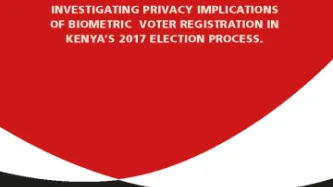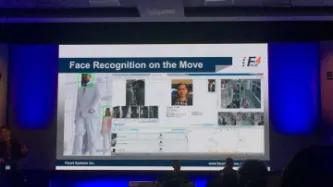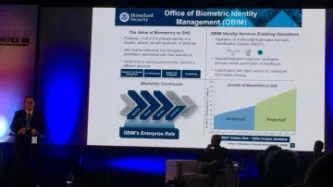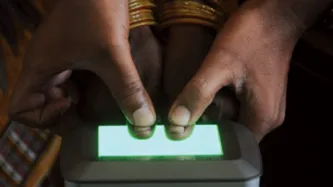Search
Content type: Long Read
By Valentina Pavel, PI Mozilla-Ford Fellow, 2018-2019
Our digital environment is changing, fast. Nobody knows exactly what it’ll look like in five to ten years’ time, but we know that how we produce and share our data will change where we end up. We have to decide how to protect, enhance, and preserve our rights in a world where technology is everywhere and data is generated by every action. Key battles will be fought over who can access our data and how they may use it. It’s time to take…
Content type: Long Read
Photo By: Cpl. Joel Abshier
‘Biometrics’ describes the physiological and behavioural characteristics of individuals. This could be fingerprints, voice, face, retina and iris patterns, hand geometry, gait or DNA profiles. Because biometric data is particularly sensitive and revealing of individual’s characteristics and identity, it can be applied in a massive number of ways – and has the potential to be gravely abused.
Identification systems across the world increasingly rely on…
Content type: Examples
The State is not always the only actor involved in the surveillance of benefits claimants. Often those practices are encouraged, facilitated or conducted by private companies. South Africa for instance mandated MasterCard to help distribute benefits through biometric debit cards.
https://www.finextra.com/newsarticle/23941/south-africa-enlists-mastercard-to-distribute-welfare-through-biometric-debit-cards
Publication: FinExtra
Content type: News & Analysis
Protest movements throughout history have helped to shape the world we know today. From the suffragettes to the civil rights movement, and to contemporary movements such as those focusing on LGBTIQ+ rights, protests have become a vital way for many, who feel powerless otherwise, to have their voices heard.
But now, making the decision to attend a protest comes with consequences that you may very well be unaware of. This is because policing and security services, always hungry in their quest to…
Content type: Long Read
The Privacy International Network is celebrating Data Privacy Week, where we’ll be talking about how trends in surveillance and data exploitation are increasingly affecting our right to privacy. Join the conversation on Twitter using #dataprivacyweek.
It is often communities who are already the most marginalised who are at risk because of the privacy invasions of data-intensive systems. Across the globe, we see the dangers of identity systems; the harms of online violence against women and the…
Content type: News & Analysis
Taylor Swift may be tracking you, particularly if you were at her Rose Bowl show in May.
According to an article published by Vanity Fair, at Swift’s concert at the California stadium, fans were drawn to a kiosk where they could watch rehearsal clips. At the same time – and without their knowledge - facial-recognition cameras were scanning them, and the scans were then reportedly sent to a “command post” in Nashville, where they were compared to photos of people who are known…
Content type: Report
The use of biometric technology in political processes, i.e. the use of peoples’ physical and behavioural characteristics to authenticate claimed identity, has swept across the African region, with 75% of African countries adopting one form or other of biometric technology in their electoral processes. Despite high costs, the adoption of biometrics has not restored the public’s trust in the electoral process, as illustrated by post-election violence and legal challenges to the results of…
Content type: Impact Case Study
What is the problem
For over two decades we have been documenting an alarming use and spread of surveillance. It is no longer just the wars on terror or drugs or migration that is driving this trend. The management of health crises and distribution of welfare regularly are among others being used to justify this turn to increasingly invasive forms of surveillance. From country to country we see the same ideas and the same profiteers expanding their reach.
When we first released our report on…
Content type: Impact Case Study
What happenedSince the late 1980s governments across the world have been trying to build identity registries. By the early 1990s, there were similar policies being pursued by a number of governments across the Pacific region, with similar technologies from the same companies. In the mid-90s ID cards became a ‘modern’ policy, implementing smart cards. By 9/11 biometric IDs became the preferred solution to undefinable problems. Then came vast databases of biometrics to identify people — with…
Content type: Long Read
Image: Eric Jones
The UK government last week hosted hundreds of surveillance companies as it continues to try and identify “technology-based solutions” able to reconcile the need for controls at the Irish border with the need to avoid them.
The annual showcase conference of 'Security and Policing' brings together some of the most advanced security equipment with government agencies from around the world. It is off limits to the public and media.
This year’s event came as EU and UK…
Content type: News & Analysis
Overview
CIPIT is currently investigating how the privacy of Kenyan citizens was affected by the use of biometric data during the just concluded 2017 general and repeat elections. The IEBC is mandated by law to register voters, verify their registration details and conduct elections. Accordingly, the IEBC is the custodian of the public voter register. There have been reports that individuals received SMS texts from candidates vying for various political seats during the campaign period of the…
Content type: Examples
A US House of Representatives oversight committee was told in March 2017 that photographs of about half of the adult US population are stored in facial recognition databases that can be accessed by the FBI without their knowledge or consent. In addition, about 80% of the photos in the FBI's network are of non-criminals and come from sources such as passports. Eighteen states supply driver's licences under arrangement with the FBI. In response, privacy advocates and politicians called for…
Content type: Examples
In 2015, the Swedish startup hub Epicenter began offering employees microchip implants that unlock doors, operate printers, and pay for food and drink. By 2017, about 150 of the 2,000 workers employed by the hub's more than 100 companies had accepted the implants. Epicenter is just one of a number of companies experimenting with this technology, which relies on Near Field Communication (NFC). The chips are biologically safe, but pose security and privacy issues by making it possible to track…
Content type: Advocacy
Privacy International has responded to the European Commission’s consultation on the interoperability of EU information systems for borders and security.
The Commission is currently looking at ways in which various border control and policing EU databases and IT systems can be connected to share and exchange more data.
The plans raise a number of concerns as highlighted by Privacy International in our response. These relate to significant potential harms associated with…
Content type: News & Analysis
From unlocking a smartphone or getting through an airport, the use of an iris, fingerprint, or your face for identity verification is already widespread, and the market for it is set to rocket. While the technology is not new, its capability and uses are. As people, biometrics offers us much, but risks ultimately only serve data-hungry industries and government agencies: in the name of efficiency and security, it has the potential to bring chaos and vulnerability.
Obtaining reliable…
Content type: News & Analysis
The United States Department of Homeland Security (DHS) has contracted one of the world’s largest arms companies to manage a huge expansion of its biometric surveillance programme.
According to a presentation seen by Privacy International, the new system, known as Homeland Advanced Recognition Technology (HART), will scoop up a whopping 180 million new biometric transactions per year by 2022.
It will replace the Automated Biometric Identification System (IDENT), which currently stores…
Content type: News & Analysis
When it comes to tackling corruption, we need to critically engage with the role of technology. One technology in particular is biometrics, a technology that identifies and stores on a database the identity of an individual through some physical characteristic, usually fingerprints or an iris scan. Biometrics is increasingly being used in ID and voter registration schemes. It is a technology that raises privacy and data protection issues but notwithstanding…
Content type: News & Analysis
Big data consists mainly of data that is openly available, created and stored. It includes public sector data such as national health statistics, procurement and budgetary information, and transport and infrastructure data. While big data may carry benefits for development initiatives, it also carries serious risks, which are often ignored. In pursuit of the promised social benefits that big data may bring, it is critical that fundamental human rights and ethical values are not cast aside.…
Content type: News & Analysis
New technologies may hold great benefits for the developing world, but without strong legal frameworks ensuring that rights are adequately protected, they pose serious threats to populations they are supposed to empower.
This is never more evident than with the rapid and widespread implementation of biometric technology. Whilst concerns and challenges are seen in both developed and developing countries when it comes to biometrics, for the latter they are more acute due the absence of laws or…
Content type: News & Analysis
Humanitarian agencies are collecting personal information for Syrians caught in the crossfire of a drawn-out and bloody civil war. Indeed, refugees fleeing persecution and conflict, need to access services and protection offered by the world’s humanitarian community. But in the rush to provide necessary aid to those afflicted by the crisis in Syria, humanitarian organisations are overlooking a human right that also needs protecting: the right to privacy.
Humanitarian and aid agencies are…
Content type: News & Analysis
Privacy International today is proud to announce our new project, Aiding Privacy, which aims to promote the right to privacy and data protection in the development and humanitarian fields. Below is an outline of the issues addressed in our new report released today, Aiding Surveillance.
New technologies hold great potential for the developing world. The problem, however, is that there has been a systematic failure to critically contemplate the potential ill effects of deploying technologies in…
Content type: Report
Information technology transfer is increasingly a crucial element of development and humanitarian aid initiatives:
social protection programmes are incorporating digitised Management Information Systems and electronic transfers,
registration and electoral systems are deploying biometric technologies,
the proliferation of mobile phones is facilitating access to increased amounts of data, and
technologies are being transferred to support security and rule of law efforts.
Many of these…
Content type: News & Analysis
Below is an excerpt of an article that recently appeared on Slate, written by our partner Kevin Donovon, a researcher at the University of Cape Town, and Carly Nyst, Head of International Advocacy at Privacy International:
"Move over, mobile phones. There’s a new technological fix for poverty: biometric identification. Speaking at the World Bank on April 24, Nandan Nilekani, director of India’s universal identification scheme, promised that the project will be “transformational.” It “uses…
Content type: News & Analysis
Few understand why we focus on refugee privacy. Funders don’t understand it so don’t fund it; the public see the plight of refugees as seen on TV, not as a privacy issue; and often times the international community does everything it can to increase scrutiny of refugees. In this blog, I highlight the privacy issues facing refugees and how these issues can jeopardize refugees’ safety as much as any of the environmental, social, or political risks refugees encounter.
Refugees are amongst…
Content type: News & Analysis
An international alliance of organisations and individuals from 27 countries has lodged a petition calling on the Council of Europe to start an indepth survey on the collection and storage of biometric data by member states.
European governments are increasingly demanding storage of biometric data (fingerprints and facial scans) from individuals. These include storage on contactless 'RFID' chips in passports and/or ID cards. Some are going even further by implementing…
Content type: News & Analysis
Two months ago, the UK Borders Agency began fingerprinting foreign children over six years old, from outside the European Economic Area and resident in Britain. At the time Jacqui Smith was congratulated for her tough line on issuing identity cards to foreign residents and no one, not even parliament, noticed that the biometric requirements applied to children of six. And parliament didn't know because it was never asked to approve the policy.
Nowhere in the world are you more powerless than…
Content type: News & Analysis
Together with a coalition with 18 Japanese rights groups, Privacy International today delivered a letter to the Japanese Minister of Justice to protest against the implementation of a fingerprinting system and face-scanning system at its borders. All visitors and many foreign residents to Japan will be fingerprinted under this plan. Our letter to the Minister is endorsed by 68 organisations from 30 countries. In our letter, we show that there are numerous problems with the government's plans.…
Content type: News & Analysis
We the undersigned are calling on you to reject the 'Draft Council Regulation on standards for security features and biometrics in passports and travel documents issued by Member States'. This is an unnecessary and rushed policy that will have hazardous effects on Europeans' right to privacy. This policy process requires additional oversight, and the eventual systems established will require significant controls and a strong legal framework to ensure that this is a proportionate response to the…
Content type: News & Analysis
For the attention of Members and staff of the European Parliament,
I am writing to you on behalf of Privacy International, a London-based human rights group, to call on you to stop the implementation of biometric travel documents.
We at PI have been monitoring the biometric passport developments for three years. Most recently we organized an open letter to the International Civil Aviation Organization (ICAO) calling for clarification and modification to the plans for the biometric passport…
Content type: News & Analysis
To the participants of the International Civil Aviation Organization 12th Session of the Facilitation Division,
We are writing to you on behalf of a wide range of human rights and civil liberties organizations to express our concerns regarding a number of decisions emerging from your conferences and their likely effects on privacy and civil liberties. We are particularly worried about your plans requiring passports and other travel documents to contain biometrics and remotely readable ‘contact…




























